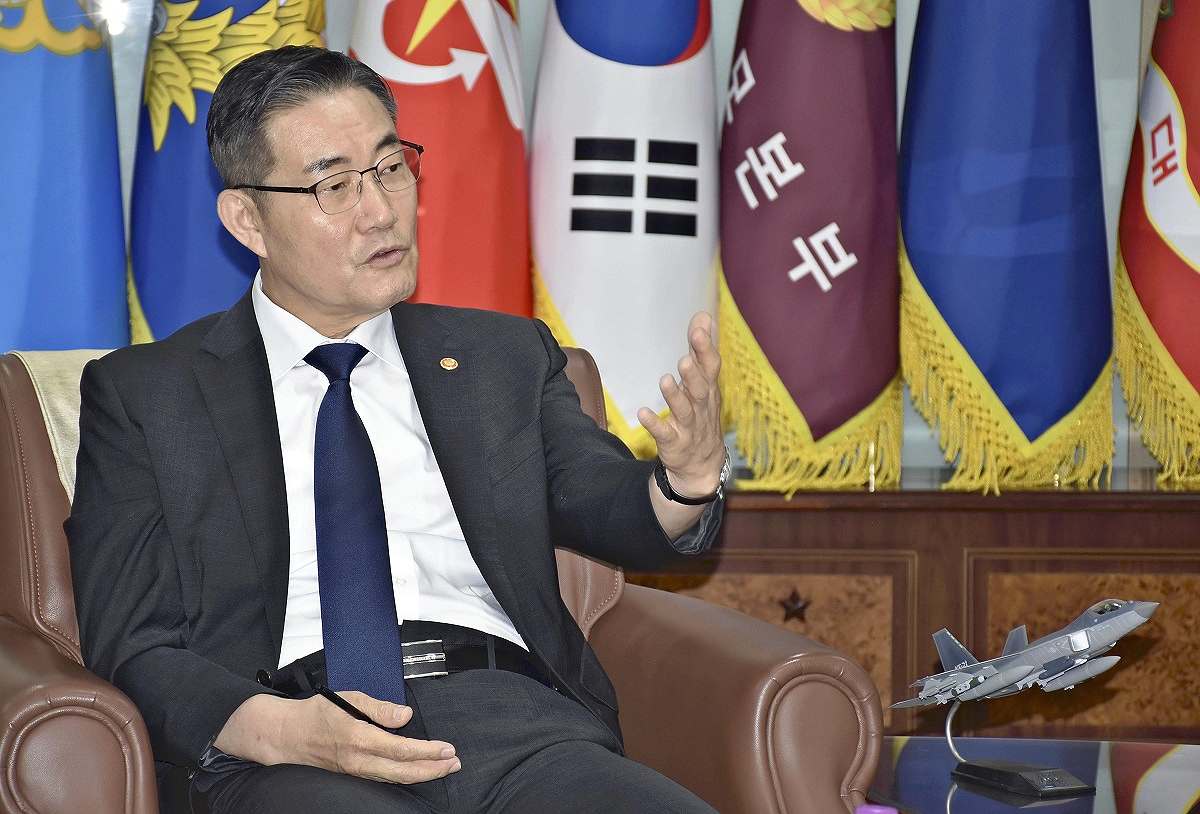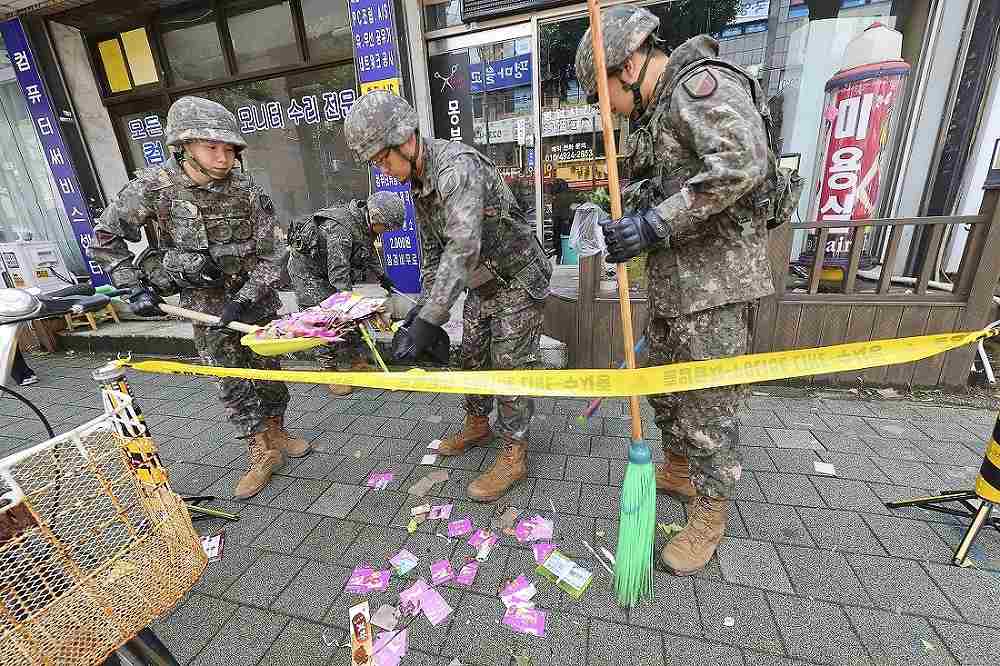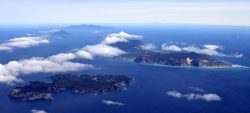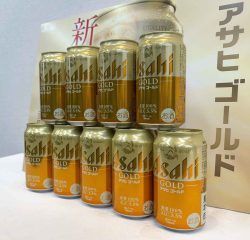ROK National Defense Minister Stresses Ties with Japan, U.S.; Boosting 3-Way Ties Eyed Before Possible Trump Return

South Korean National Defense Minister Shin Wonsik speaks during an interview with The Yomiuri Shimbun in Seoul on Monday.
1:00 JST, July 25, 2024
SEOUL — South Korean National Defense Minister Shin Wonsik said in an interview with The Yomiuri Shimbun in Seoul on Monday that it is important to establish security cooperation among Japan, the United States and South Korea.
He stated that Japan-South Korea and Japan-U.S.-South Korea security cooperation “has never been more important than today” as a means of countering the North Korean threat.
The three countries have reached a general agreement to create a framework on joint training and other matters to make cooperation between defense authorities “irreversible,” he said.
Institutionalizing cooperation
Shin is the second defense minister in the conservative government of Republic of Korea President Yoon Suk Yeol. His conversation with The Yomiuri Shimbun, which lasted about an hour, was his first interview with the Japanese media.
By attending the Japan-South Korea and Japan-U.S.-South Korea defense ministers meetings in Tokyo on Sunday, he will become the first South Korean defense minister to visit Japan in 15 years.
At talks among the defense ministers of Japan, the United States and South Korea in Singapore, the three agreed to draft a framework for trilateral security cooperation by the end of this year.
They aim to institutionalize trilateral cooperation in preparation for the possible reelection of former U.S. President Donald Trump in the November U.S. presidential election, given his reluctance to strengthen the alliance.
Shin said South Korea had proposed the creation of the framework to Japan and the United States, explaining, “We are trying to create a framework that will serve as a standard for ROK-U.S.-Japan security cooperation and make it irreversible and irrevocable.”
The content of the framework will establish principles for joint training, exchange of senior officials and information sharing, he said.
In late June, the three countries conducted a trilateral joint exercise called Freedom Edge, the first iteration of the new multidomain trilateral exercise, covering sea, air and cyberspace.
Shin also said that the exercise was conducted at the suggestion of South Korea and that the results “improved the ability to deal with North Korea’s nuclear weapons and missiles.”
Regarding Japan-South Korea relations, Shin said: “Considering geopolitical requirements, security and economic conditions, bilateral cooperation is indispensable. Although we have different positions on some points, there can be no two opinions in the area of security cooperation.”
Japanese Defense Minister Minoru Kihara and Shin agreed at a meeting in early June to prevent a recurrence of the December 2018 incident in which a South Korean naval vessel directed its fire-control radar at a Maritime Self-Defense Force patrol aircraft.
With this agreement, “we have laid the foundation for strengthening security cooperation between ROK and Japan, as well as between ROK, the United States and Japan,” Shin said.
He expressed his desire to “resume the suspended interactions between the ROK military and the Self-Defense Forces and restore various channels of communication.”
He cited the North Korean nuclear issue as a common threat to Japan and South Korea. In particular, he analyzed North Korea’s accelerated development of tactical nuclear weapons, saying, “Although actual deployment has yet to be confirmed, North Korea may be in the process of completing the development [of such weapons]. Shin warned that “the weapon’s range covers areas where the U.S. military has bases in Japan, so North Korea may attempt to use nuclear weapons in time of contingency.”
Taiwan contingency
Given the deteriorating security situation in the Indo-Pacific region, Shin said: “We must not change the status quo by force. If someone does, we must deal with it through joint action.” Although he avoided naming names, he apparently had China in mind.
Speaking about South Korea’s response in the event of contingency in the Taiwan Strait, he stated that the South Korean military and U.S. forces in South Korea should not dispatch troops to the area surrounding Taiwan.
Shin said that if North Korean leader Kim Jong Un launches a military provocation by exploiting a gap that might open if the attention of the United States and other countries becomes focused on the Taiwan issue, Japan and the United States would be forced to conduct “two-front operations,” on the Korean Peninsula and in the Taiwan Strait region. This will become a heavy burden for the two countries as well as for South Korea.
“ROK will firmly protect stability and peace on the Korean Peninsula. That will also be good for stability and peace in the Taiwan Strait region,” he said.
ROK vigilant on Russia-DPRK ties
The minister expressed strong alarm over the rapidly strengthening relations between Russia and North Korea.
“North Korea has secured the backing of Russia, which has given it the opportunity to strengthen its military technology,” Shin said.
According to Shin, the first confirmed arms supply from North Korea to Russia was in August last year. It involved a ship bound for Dunai in the Russian Far East from Rajin in northeastern North Korea. As of July 15, the number of containers transported to Russia reached 11,000 or over enough to hold 5.2 million rounds of 152mm artillery shells. He said he believed that “about several dozen” ballistic missiles were also provided.
In return, North Korea is believed to have obtained food, oil and technology related to the launch of a military reconnaissance satellite. However, Shin said the technology obtained from Russia “is not certain to lead to a successful launch.”
In June, Russia and North Korea signed the DPRK-Russia Treaty on Comprehensive Strategic Partnership, which stipulates mutual military assistance in case of emergency. Shin said that “there is a situation” in which North Korea may deploy troops to areas occupied by Russia in Ukraine. “We don’t think they are combat units,” Shin said, suggesting they could be engineering units engaged in restoration work.
“Russia and North Korea have criminally colluded, but in the medium to long term this will do great damage to both sides,” Shin said. He noted that North Korea’s supply of arms and other items to Russia has led European countries to perceive North Korea as a substantial threat.
Shin strongly criticized Russia, saying Moscow “begged North Korea for obsolete artillery shells and committed the contradiction of directly violating U.N. Security Council sanctions, which Russia itself had agreed to.”
Shin indicated that, depending on Russia’s future moves, South Korea would not rule out the option of Seoul providing Ukraine with lethal weapons.
***
Shin Wonsik
Shin Wonsik, 66, is a former lieutenant general of the Republic of Korea Army. He served as commanding general, Capital Defense Command, and vice chairman of the Joint Chiefs of Staff. He was a member of the National Assembly for the People Power Party, the ruling conservative party, and has been in his current position since October last year.
Top Articles in Politics
-

Japan PM Takaichi’s Cabinet Resigns en Masse
-

Sanae Takaichi Elected Prime Minister of Japan; Keeps All Cabinet Appointees from Previous Term
-

Japan’s Govt to Submit Road Map for Growth Strategy in March, PM Takaichi to Announce in Upcoming Policy Speech
-

LDP Wins Historic Landslide Victory
-

LDP Wins Landslide Victory, Secures Single-party Majority; Ruling Coalition with JIP Poised to Secure Over 300 seats (UPDATE 1)
JN ACCESS RANKING
-

Producer Behind Pop Group XG Arrested for Cocaine Possession
-

Japan PM Takaichi’s Cabinet Resigns en Masse
-

Man Infected with Measles Reportedly Dined at Restaurant in Tokyo Station
-

Israeli Ambassador to Japan Speaks about Japan’s Role in the Reconstruction of Gaza
-

Videos Plagiarized, Reposted with False Subtitles Claiming ‘Ryukyu Belongs to China’; Anti-China False Information Also Posted in Japan

























